#yvette picard
Text
I am once again begging Star Trek to hire a mental health, neurodivergence, and disability consultant.
#star trek picard#star trek strange new worlds#star trek discovery#star trek lower decks#star trek prodigy#yvette picard#jack crusher#seven of nine#raffi musiker#chris pike#una chin riley#spock#hemmer#dal r'el#beckett mariner#its every series#social scientists matter
283 notes
·
View notes
Text
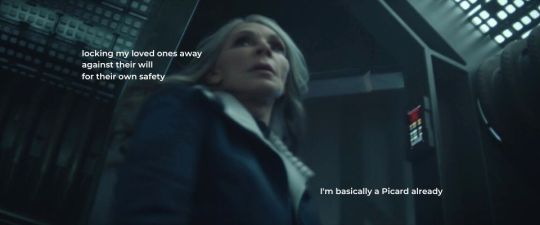
Pixie Recaps Picard | The Next Generation
94 notes
·
View notes
Text
There is a Star Trek fanpage I follow on Facebook and occasionally the guy running it talks about old and new episodes of Star Trek and about his impressions on them.
When Picard S2 was coming out, the guy made a post about how the show handles Yvette Picard's mental illness; and he pointed out that Star Trek universe seems to have highly advenced medicine and medical technology but the psychology is "straight out of 19th century". Yvette's condition is handled terribly - instead of sending her to psychological facility, her husband not only treats her himself (which is shady at best) but he also does this by locking her inside her room. In the end, she commits suicide.
The only justification we get for this all, is that Yvette refused to seek help of a specialist.
At the same time, most revolutionary psychological facilities we see throughout Star Trek universe are Arkham Asylum at best and "some species believe lobotomy is the best solution" at worst.
Really, the only somehow good representation of therapy and psychological professionals in Star Trek future seems to be Counselor Troi.
28 notes
·
View notes
Text
Sarah Sisko is the reason why Yvette's fate in Picard, season 2, is still only the *second* worst retcon related to a Star Trek captain's mother.
13 notes
·
View notes
Text
Doctor! Doctor!
When it comes to parts for women in sci-fi, I may be starting to pick up on a pattern here...
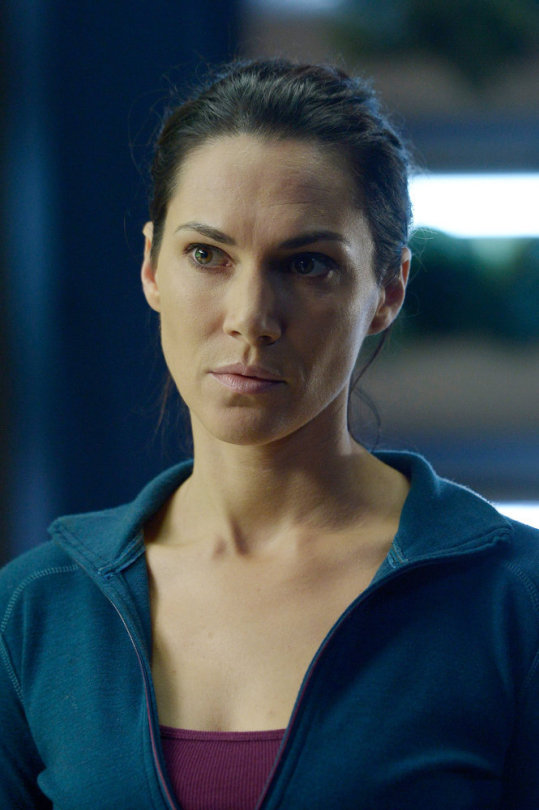
Kyra Zagorsky as Dr Julia Walker in Helix
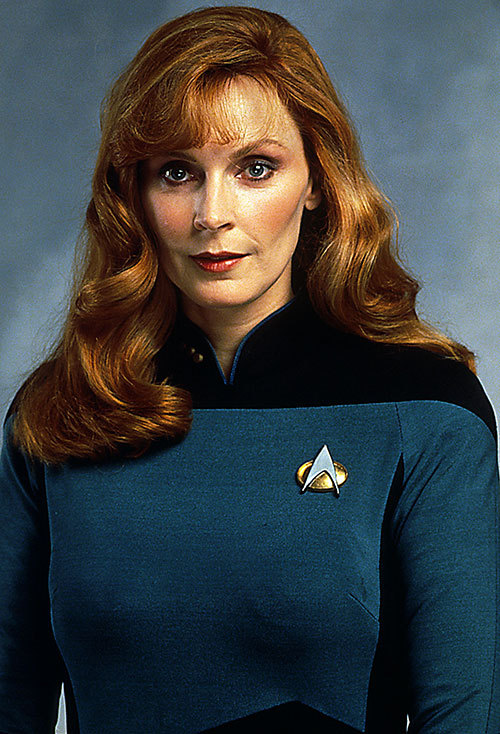
Gates McFadden as Dr Beverly Crusher in Star Trek: The Next Generation
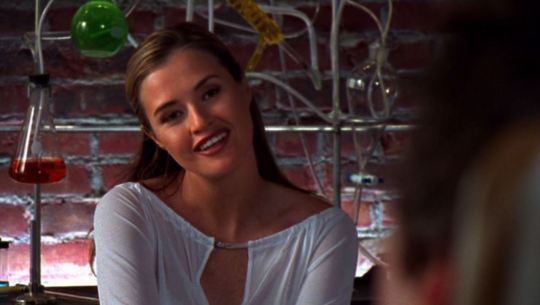
Shannon Kenny as Dr Claire Keeply in The Invisible Man (2000)

Kari Matchett as Dr Mariel Underlay in Invasion (2005)

Kim Cattrall as Dr Sheila Moran in Invasion (1997)
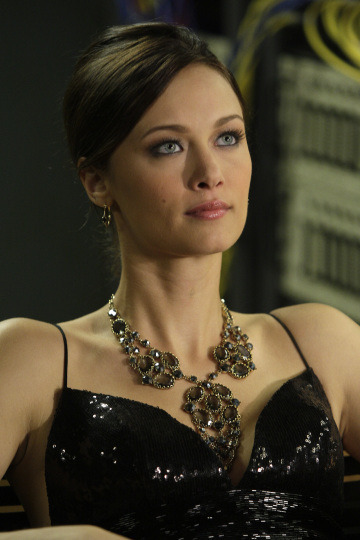
Deanna Russo as Dr Sarah Graiman in Knight Rider (2008)
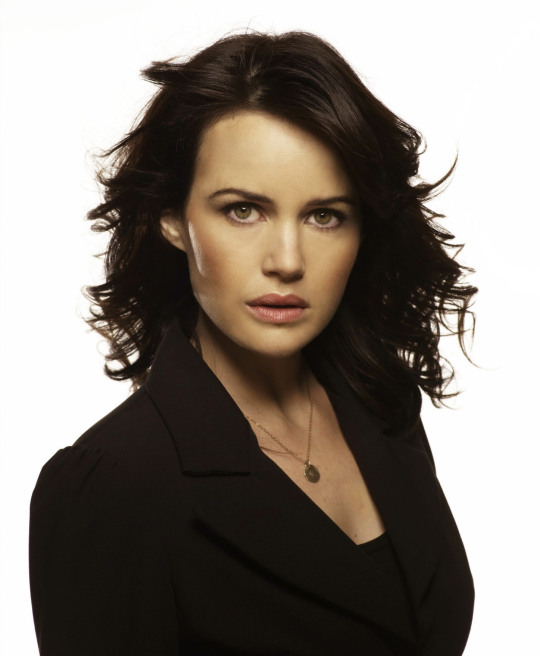
Carla Gugino as Dr Molly Anne Caffrey in Threshold
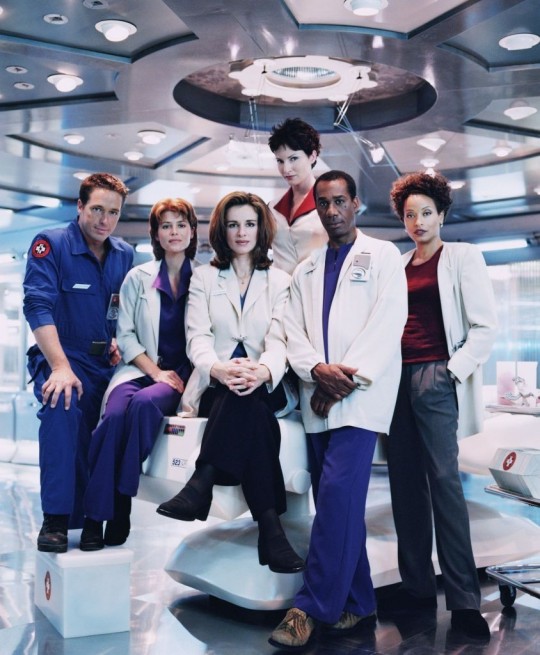
Maria del Mar, Alexandra Wilson, Gay Thomas Wilson as, respectively, Dr Haylen Breslauer, Dr Dru Breslauer and Dr Rema Cook in Mercy Point
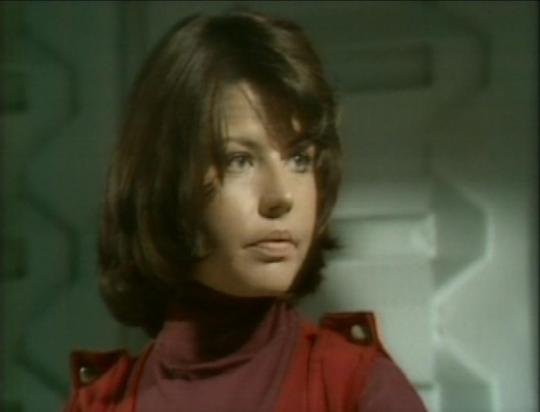
Fiona Gaunt as Dr Helen Smith in Moonbase 3

Lee Meriwether as Dr Ann MacGregor in The Time Tunnel
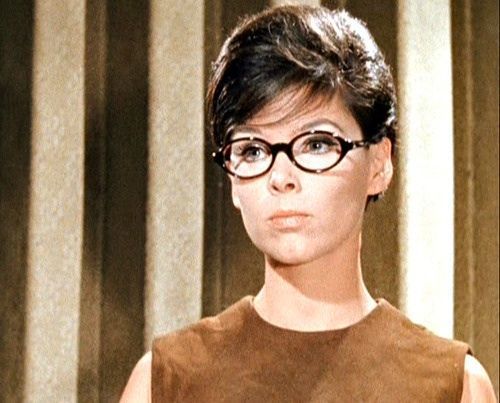
Yvonne Craig as Dr Marjorie Bolan in Mars Needs Women
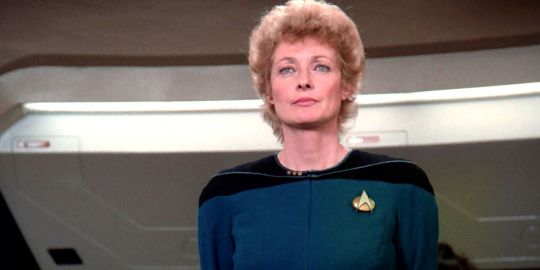
Diana Muldaur as Dr Katherine Pulaski in Star Trek: The Next Generation
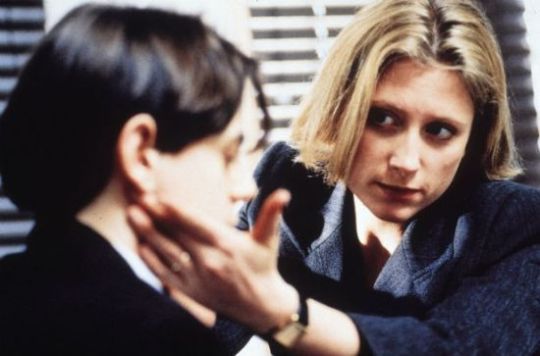
Susannah Harker as Dr Angela Marsh in Ultraviolet

Lynda Mason Green as Dr Suzanne McCullough in War of the Worlds (1988)

Lois Chiles as Dr Holly Goodhead in Moonraker
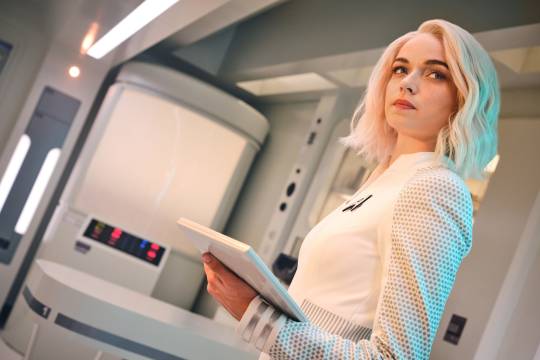
Jess Bush and Dr Christine Chapel in Star Trek: Strange New Worlds
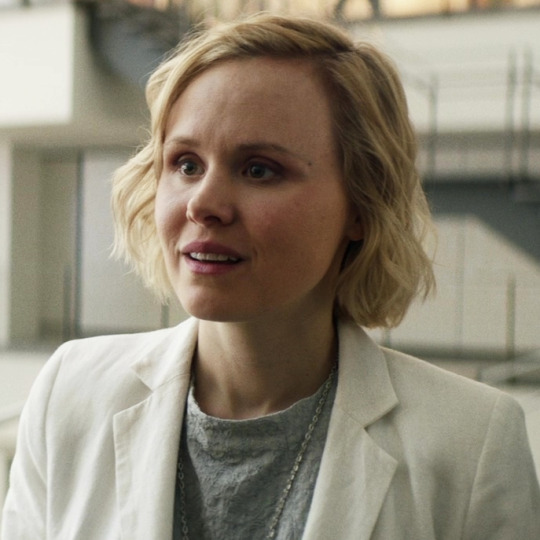
Alison Pill as Dr Agnes Jurati in Star Trek: Picard
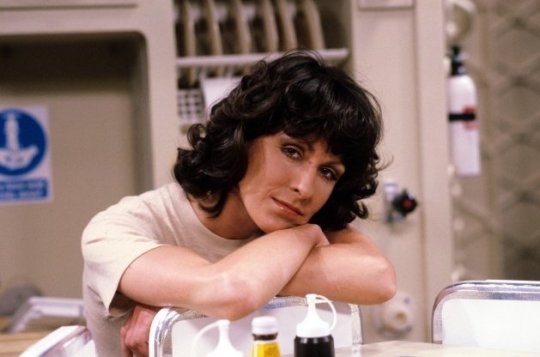
Carmen du Sautoy as Dr Gentian Foster in Astronauts
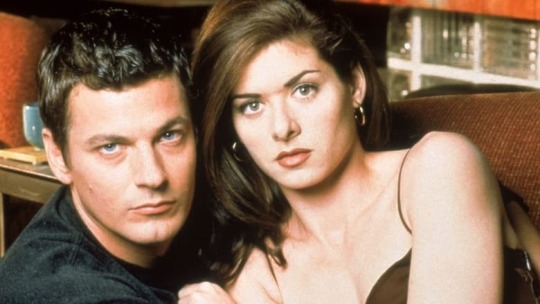
Debra Messing as Dr Sloan Parker in Prey
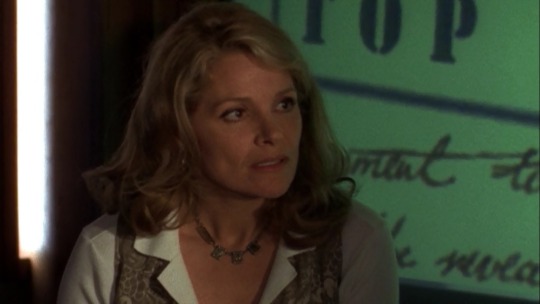
Helen Shaver as Dr Rachel Corrigan in Poltergeist: The Legacy

Denise Richards as Dr Christmas Jones in The World is Not Enough

Hermione Norris as Dr Stella Isen in The Outcasts
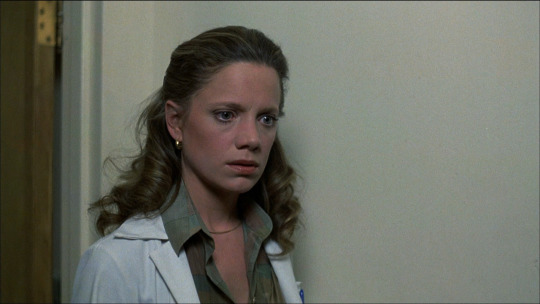
Gretchen Corbett as Dr Maggie Sheridan in Jaws of Satan
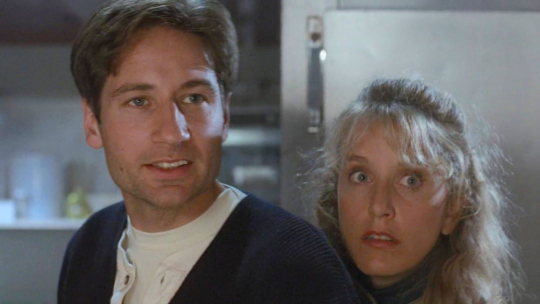
Felicity Huffman as Dr Nancy Da Silva The X-Files 'Ice'
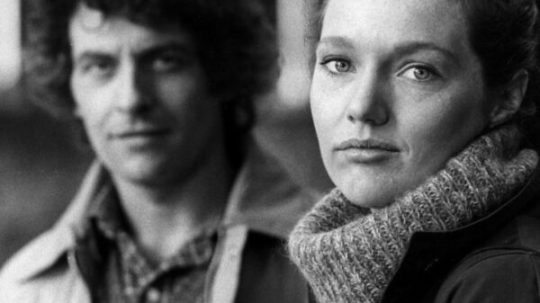
Louise Jameson as Dr Anne Reynolds in The Omega Factor
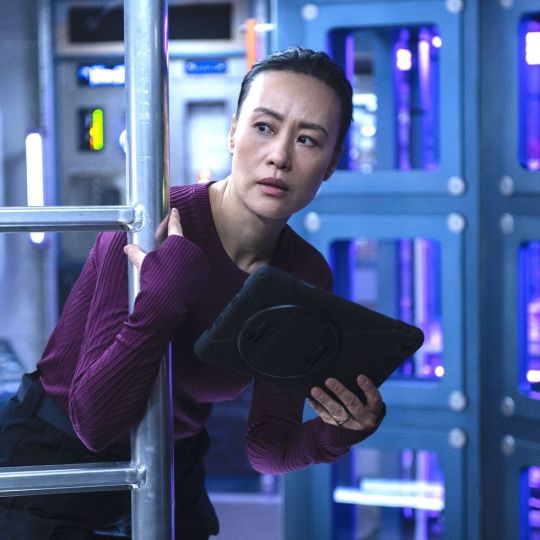
Vivian Wu as Dr Lu Wang in Away
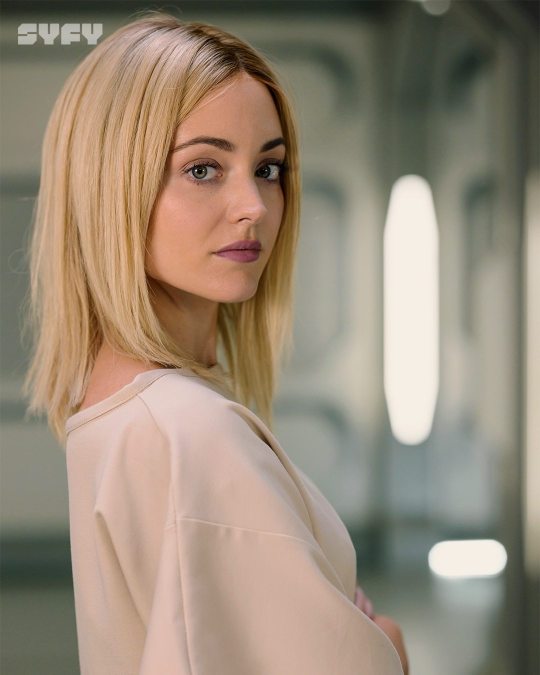
Christina Wolf as Dr Cat Brandice in The Ark
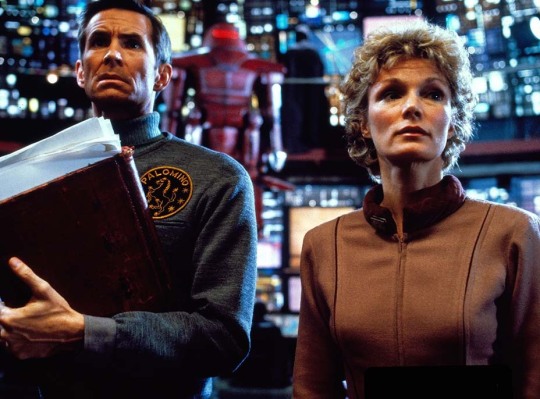
Yvette Mimiuex as Dr Kate McCrae in The Black Hole
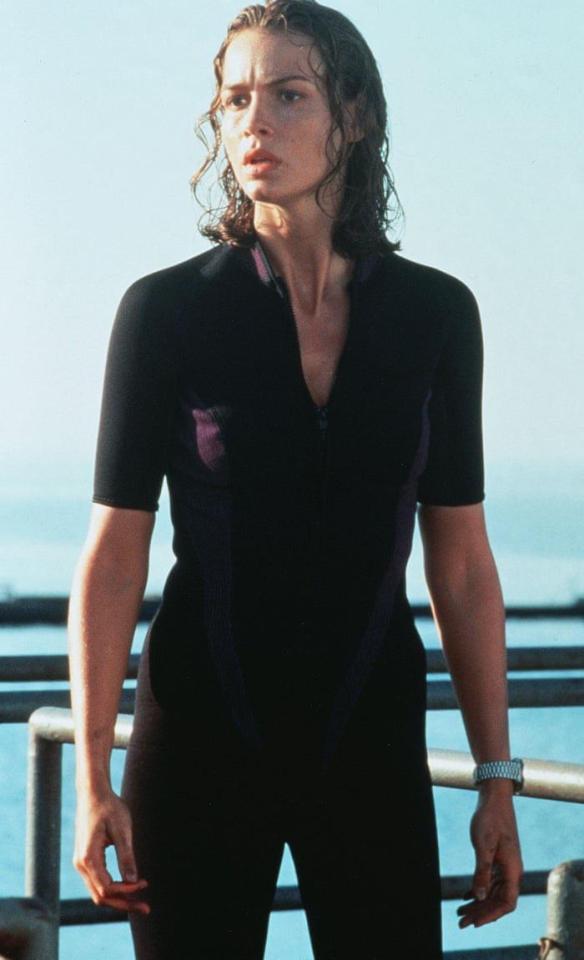
Saffron Burrows as Dr Susan McCallister in Deep Blue Sue
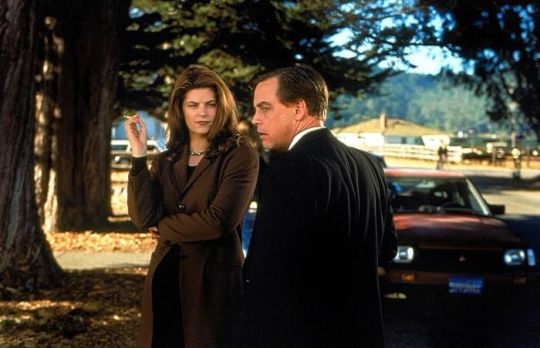
Kirstie Alley as Dr Susan Verner in Village of the Damned
And that's only the first 30! Stay tuned for the next installment!
5 notes
·
View notes
Text

Yvette and Jean-Luc Picard
6 notes
·
View notes
Text
so we finished watching season 2 of Picard last night, and just. whew, friends, what? a truly baffling array of choices. things i simply cannot get over:
the commitment to doing every Single joke from The Voyage Home while simultaneously Strenuously Avoiding doing anything campy or goofy
like, the reason TVH works is that the main cast are all just Buffoons — Kirk does not know how money works, Spock is dressed as a jogger in a bathrobe, Scottie tries to talk into a computer mouse, and it is all GREAT. in Picard S2, it's like, they say they don't know much about this period in history, but they all seem to click into place fairly seamlessly. in general watching this new era of Trek, it feels like the writers have simply forgotten the pleasure of a good silly camp romp, and constantly referencing one of the best silliest campiest romps in the canon is uh, not helping
the climax of the season revolves around?? Q's character development??? Q???? QUEUE?????? baffling
in general what was even Q's plan here. is he . . . trying to sabotage the Europa mission or not? why is All Of This necessary for Picard to forgive himself, if that's Q's real goal? just like generally this framing does not make sense to me and so resting the entire season on it is. a choice, i guess
also when have we ever been asked to care about Q's interiority before, when have we ever been asked to be On His Side as opposed to whatever human he's fucking with
how are we relating to canon here. h o w. there are some Real deep cuts, but then also some like, fairly prominent episodes that are just?? ignored???
like, ok:
Guinan and Picard have a fairly significant adventure together in 1800s San Francisco (in “Time’s Arrow”). it is canon then that she doesn't know Picard yet. this is an incident she will remember for 500+ years and reference on board the Enterprise D. but in this season of Picard, she appears not to know him at all and to once more be meeting him for the first time. these two first meetings are . . . difficult to reconcile
but we are apparently doubling down on “Wesley Crusher was just the super specialest boy and he managed to transcend the limits of physical reality because of his big special brain”
we are apparently pretending that Robert Picard just . . . doesn't exist? isn't around for Jean-Luc's childhood? this isn't really technically a continuity error but Robert and Jean-Luc's relationship felt real and specific and grounded in the particulars of their two characters whereas Yvette just feels like generic sexist “ooooooh his mother was ~crazy~” schlock, and losing the former for the latter is uh. not an improvement
we're doubling down on Gary Seven, tho! Gary fucking Seven!!!!! remember that beloved character from an episode that was definitely a good idea??? why
actually, specifically, tho: it feels like this is a continuation of Star Trek’s reluctance/inability to grapple with the less savory parts of Gene Roddenberry as a human being, particularly his misogyny. to stick only to the example at hand, he made the “Assignment: Earth” filming experience so miserable for Teri Garr (by, for example, relentlessly shortening the length of her skirt, even over the objections of the costume designer) that Garr has absolutely refused to talk about Star Trek in subsequent interviews. i was obviously not on set, but the vibe i get is extremely that filming that episode would clearly and unambiguously been a hostile workplace environment by contemporary standards of sexual harassment. so i, personally, have a hard time being like “ah yes, ‘Assignment: Earth’, what a fun bit of forgotten canon to incorporate wholesale into our new series without grappling with the specifics of its creation in any way!”. the vibes are just . . . rancid
anyway, moving on from continuity gripes,
it feels like a real missed opportunity to have not cast David Duchovny as the FBI agent. this is really not the showrunners’ fault, but i’m in a hating sort of mood, so i’m going to take off points anyway
“Dark Page” was not a great idea in 1993 and it isn’t any better now
circling back to “covering the hits without any understanding of what made them good”, Raffi’s encounter in a camp of unhoused people feels like a nod to “Past Tense” without any willingness to actually . . . engage with what “Past Tense” was saying. for all that i have some issues with some of its narrative choices, “Past Tense” devotes significant, sustained screen time to characters that society has decided to discard and is relentless in hammering home the message that “this is not just and it cannot be reformed into justness”. here, Raffi stumbles across an encampment, someone immediately tries to mug her at gun point, she beats him up, she shares a rueful quip about “gosh, wild that such a prosperous society can’t be assed to take care of people”, and then we just move on and never mention this again. like, we get Words saying that Homelessness Bad, but what we are shown is “unhoused people are scary and dangerous and it’s ok for our heroes to beat them up”
(i actually think that In General there is a lot of wasted potential with Raffi, altho mostly the fault here lies in season 1. “very competent Starfleet officer who is also dealing with paranoid delusions and falling apart at the seams about it” is an interesting premise for a Star Trek character if done well! and then S1 is just like “oh, nope, actually, she was right about everything, there was a massive, bizarre conspiracy that did exactly what she thought they did, she's fine and correct and everyone who ever doubted her is an ass”)
(i also think that the “love always ends in grief” sequence from Discovery S4, for all of that season’s considerable messiness, is a much tighter and more powerful expression of that theme than the wandering, haphazard approach to it here. i think these shows are meant to be watched in concert, but the back-to-back seldom does Picard any favors)
we continue to lean into Human Exceptionalism and i continue to roll around on the floor going “ughhhhhhhhhhhhhhhhhhhhhhhhhhhhhhhhhhhh” about it
more elaborate thoughts on that go in my “if i were making Enterprise” post, tho
THAT SAID
on the topic of exceptionalism, i hate the FUCK out of the bit in Crusher’s recruitment speech where he’s like “do you want to be ordinary, or do you want your life to have purpose and meaning?” as tho???? ordinary lives????? cannot have purpose and meaning???????????? look me in the eyes, writers. no, no, look me Directly in the eyes: fuck you, fuck that, i am doing cartoon violence to you. the mindset that only extraordinary lives are worth living is toxic bullshit that distorts so much of our mental, political, and artistic landscape. ordinary lives can have so much meaning and purpose, they can be so very beautiful and rich. ordinary lives can be very good to live. i think Star Trek, in general, focuses too much on elites as The Only People Who Really Matter, but to elevate that to the level of explicit text is just. fucking devastating. unspeakably bleak. absolute philosophical train wreck of a season finale, on a par with Discovery’s “a Starfleet admiral actively and deliberately planned and tried to carry out a genocide and faced zero career repercussions for it that we can see”. clown car nonsense
in conclusion: i have drunk the haterade, g-d this season sucked, i can’t wait to make April 13 “Jurati eating car batteries day” and take it away from the Homestucks
#let's take a walk thru these here stars#did i have a Picard tag? i feel like i can't possibly have#thinky thoughts#Star Trek: Picard#Picard S2#unabashed hatery#i promise we can stop doing Wrath of Khan again now i promise i promise i promise#also like#i don't even want to get into the "why did we have to just sit thru an entire fucking fascist rally#or the implication that uh. fascist Earth would be really successful at fighting the Borg actually#IN GENERAL i think our fiction is Way too ready to paint fascists as Very Competent At War#they are not#i don't know how many people know this but there was a small little tiff called World War II#and the fascists did not win it#because fascists are incompetent and fascism is inherently unstable as an ideology#Umberto Eco said that fascists are condemned to lose wars because they are incapable of realistically assessing the strength of their enemi#and he was RIGHT#obviously that should be “enemies” but APPARENLY my tags are too long#whatever#anyway#rants#sigmastolen#i feel like you will appreciate this even if you don't watch Picard
15 notes
·
View notes
Text
Picard

The one thing, the only thing that I really cared about with Picard Season 2 was this moment where he hugs Q. I don't know if I just figured out he was dying all on my own, or I read spoilers at some point. But I'm pretty sure I saw this and decided there was really only one reason for this. I mean, I guess Q could just be "going away for a really long time." Like he got a job screwing with some other characters in a different dimension, and he won't be back before Picard dies of old age. But it simplifies things if he's just dying, or whatever the Q version of death is.
And I guess the basic idea is sound. Q knows he's only got so much time left, and he wants to spend it on one last romp with Picard, and this one is extra special because it forces Picard to confront his feelings about his mother's suicide.
I don't like Yvette's suicide in a vacuum. It's pretty fucking dark, and the gravitas it would have had in another show is wasted in Star Trek: Picard, which does constantly hotshots dark moments in a vain effort to be profound. By the time we get to Yvette's noose we've already seen Icheb's eye get plucked out, several other character deaths, Evil General Picard's skull collection, and all the spooky hallucinations and flashbacks that foreshadowed the Yvette reveal. The actual reveal gets lost in the shuffle.
Still, for what they were trying to do with Q, the gesture he was trying to make to Picard, it almost has to be something that big and character redefining. It's just that it's a good idea that was cast in the purgatory of this tedious bullshit show. Q's powers giving out was completely unnecessary, except as a way to drag out the story. Now he has to walk everywhere and use proxies like Adam Soong, which just ruins the pacing. All the other Q stories are settled in two hours or less, and that's because he can appear whenever and wherever to gas up the plot, or vanish to allow the story to simmer. But Picard isn't built that way.
The thing I realized today is that this show, and others like it, relies more on the audience speculation than the actual writing. What I mean by that is: You get one story over several episodes, and you're supposed to watch them over a span of time, and between episodes you're supposed to wonder about what's going to happen next. You're expected to rewatch the episodes you have access to and search for clues, formulate fan theories, and then tune in for the next one and see if you were right. And there's fun to be had there, but with Picard, it feels like the show is constructed more to tickle the viewer's curiosity more than actually telling a compelling story. For example:

Most of this episode is about the good guys trying to protect Renee and the Europa launch so Adam Soong doesn't spoil it. Q's nearly powerless, and the Borg Queen left in the previous episode, so there's no one left to be the villain except Soong, and he's... not a strong enough character to carry that off. He tries to poison Renee with a fast-acting neurotoxin, but Gary Eight fakes him out with a decoy. Soong's backup plan is to destroy the spacecraft itself with drones, but Raffi hacks their guidance system and Rios manages to use one drone to take out the other three. Then Kore reappears to reveal she erased all his research files, just to twist the knife. Utterly defeated, Soong reaches into his desk and pulls out a file entitled "PROJECT KHAN". You know, like the Star Trek villain. Khan? You know who that is? Do you?
It's... a dumb moment. This story is over, so there's nowhere for it to go. The good guys return to 2401 at the end of this episode, so they don't have to deal with the Eugenics Wars. And we already know how Khan ended up. This show isn't gonna pay any of this off.
But earlier in this viewing, I considered that maybe Adam Soong had something to do with the Eugenics Wars, since he seemed to be a hawk for genetic engineering, and then it turned out he cloned dozens of daughters in some sort of weird experiment. So during the long, dull minutes of this season, I wondered if maybe he was going to turn out to be involved with Khan and the Eugenics Wars somehow. That was kind of fun. And I was right! Good for me!
Except... I had to make my own fun. The text of Star Trek: Picard doesn't actually do much with any of this. Adam Soong's arc in this season is:
Whoa, what's Brent Spiner doing here?
Oh, he's a scientist with a sick daughter, and he's desperate enough to help Q.
Oh, he's turning into a huge dick. It's like Q corrupted his love for his daughter. Very tragic.
Oh, he's some sort of shady war criminal? So he's always been like this, and he always will be.
It's not much of a character arc at all, is my point. The real fun of Adam Soong depends on the audience to try to figure out his whole deal. Maybe he's Alton Soong from the 25th Century, or Data in disguise! Maybe he's Lore! Maybe he has an army of Kore clones in his basement! But the dirty little secret is that he really isn't that interesting at all. And by the time you find out what he really is, it's the end of the season, and they got away with wasting your time with a dud character.
The "PROJECT KHAN" folder is this cheap prize they give you at the end to reward you for sticking around this long. "Hey, you were right, he really is important because he invents Khan later." But it doesn't actually matter because this is his last appearance. It's just Brent Spiner holding a folder.
The same thing applies to Wesley Crusher showing up to recruit Kore into the Watcher/Traveler organization. I guess the idea here is that the Gary Seven people and the Travelers were in the same group? And now that Renee's Watcher is dead, they have a vacancy. But what makes Kore special? Like, Wesley had all these special talents and gifts. Kore spent her whole life indoors waiting for a cure for her genetic ailments. I mean, maybe she's a super-genius, but they never showed that. It just feels like they worked this in to cover for the fact that they never did much with Kore. "No, no, we meant to overlook Kore! That way you'd never see it coming when we... uh... uh... have her team up with Wesley Crusher! Wow!"
I mean, it's nice to see Wesley. I wasn't sure if he was in this series or not, so I can check off that box. I'm glad he's doing well. But it just doesn't matter. I guess they might still turn up in Season 3, but I doubt it.
So, once Q takes everyone back to their own time, we get back to the Borg crisis from the beginning of the season, and it turns out it's Jurati, and she set all this up to coordinate some big joint mission to save the galaxy from another space anomaly. It really doesn't mean anything, but they had to do some big feel-good thing to pay off the Borg. Jurati's Borg are good guy Borgs, I guess, and they request provisional Federation membership. I guess.
I think that's about all I wanted to go over. There's some interesting ideas in this, but the show is so plodding and slow that it never manages to land any of its best shots. Again, all I cared about was Q and Picard hugging. They could have done anything else to set up that moment, and it probably would have been better. Maye Q uses Picard's house as his own hospice, and Picard's stuck with him as a roommate for a while. Maybe he tries to take Picard on some goofy fantasy adventure but his heart just isn't into it, so Picard takes him out for drinks instead. Maybe they just give in to 30+ years of sexual tension and have dirty, nasty, old man sex for three episodes straight.
Oh, and Elnor's alive again. For all the difference it makes.
#mike watches picard#sheer fucking hubris#i like the candy cane stripes on the project khan file#like the shady organization that wrote the file wanted people to know it's hazardous#watch out for khan he's a flammable solid
6 notes
·
View notes
Text
Harm reduction or abdication? Balancing power, care, and autonomy in Picard's Federation.
The series presentation of mental health as an unsolved problem and the way it uses characters with questionable mental health within the narrative has provoked a lot of consternation and even backlash. The role of mental health in the narrative is something I discussed previously.
I'm picking back up on that theme to discuss and perhaps over analyze what the Federation's treatment of people with mental illness tells us about its relationship to the individual and to individual freedoms. Implied too is that the Federation of Picard is a place where straight forward solutions to ethical dilemmas we are grappling with today have not been found.
This is part of a series of essays reevaluating Star Trek Picard and interrogating the widely held fandom criticism that Picard made the Federation into a Dystopia.
Balancing Harm Reduction and Overreach:
What do Raffi and Yvette Picard tell us about the Federation and how it understands the relationship of the state to the individual?
As I made a note of discussing the Federation and mental health, Raffi lives alone in a national park and is free to take recreational drugs and be depressed as long as she doesn’t make a nuisance of herself.
When I say she is “free to” I don’t mean that sarcastically either. I also want to be extremely mindful of over emphasizing Raffi’s condition circa season one or be guilty of trivializing the impact it has had on her life. I am mindful of my own position in this as someone outside of the narrative, attempting to analyze a fictional character, with no special training, and even if I did have special training: I am someone who firmly believes in the Goldwater Rule. So take all of this with a medically inadvisable amount of sodium.
The freedom to be angry, depressed, and even self destructive, within reasonable limits, and not have someone drag you off to treatment against your will or make you contribute to society according to someone else’s rubric is a kind of freedom. In ethics and political science, this is often referred to as negative freedom or freedom from. As in freedom from someone else defining your ideal cognition or approach to life.
Raffi’s situation before Picard shows up with his bottle of wine and seduces her with stories of Romulan death squads represents freedom from material want. That’s the post scarcity promised by the techno utopian aspects of the setting, presuming we are humane enough to be happy with equitably shared abundance instead of still seeing a need to hoard and make people jump through hoops to prove their worthiness to exist.
Raffi’s state of affairs as of when we meet her in the present can be read one of two ways depending on your feelings about a number of thorny questions. Maybe it's the state failing her and refusing to take responsibility for her. If you are primarily viewing modern culture in terms of its abdications, this is a very natural lens to see through.
The alternative viewpoint is that it's the state exercising restraint and choosing to set a high bar for denying a citizen her right to autonomy. Raffi may or may not have the capacity to coolly judge the benefits and consequences of treatment in actuality but, from the perspective of the Federation, the presentation of her symptoms is not sufficient for the Federation to make that choice for her. I want to be clear that I am well aware this sort of argument is routinely used to pretend that the denial of basic necessities of life and dignity by the state or a free market is a freedom from unions, state dependency, or any number of "freedoms from" that I regard as disingenuous.
I don’t bring this up to be flippant and to dunk on whichever ideological label you’d like to associate with each side of that argument or whichever side you think makes the weakest case. I avoided labels in the effort to have this part of the conversation taken more seriously.
When a person can be deemed to be no longer capable of making decisions for themselves is among the most important questions a society can ask itself.
Erring on the side of autonomy risks needless suffering, even danger: hence the arguments in favor of red flag laws. Indeed, (season two spoiler) Yvette Picard may have lived had she been subjected to a mandatory mental health screening and treatment.
Although this assumes the Federation has effective mental health treatments that don’t require a consenting patient. Given the emphasis on talk therapy in TNG and DS9, the Federation seems to prefer adaptation and accommodation over medical intervention. Which in turn implies that the brain is a tricksy thing to work with, even in the 24th century.
Erring on the side of safety and the elimination of suffering risks pathologizing people who are suffering from being a poor fit for their environment or the mislabeling of disruptive people to make them conform.
Treating people who struggle to conform as if they have a mental health problem was done previously to women who were unhappy with their assigned social roles, queer people who suffered from being unable to lawfully and emotionally accept the dictates of their natures, and is now the preferred way of addressing children who do not conform to their birth assigned gender in many parts of the United States, including where this author lives.
When mental / emotional suffering is because of circumstance not nature, a society that has no place for people who need a different set of norms may act to correct that suffering in a fashion that enacts a terrible price.
#star trek picard#star trek ethics#star trek mental health#fictional politics#ethical case studies#star trek morality
3 notes
·
View notes
Text
A revised History of Star Trek
https://ift.tt/wG3KQB7
by RogueAquarius
There is an unfortunate truth in Star Trek that characters who ought to be important are often treated like they don't exist, are poorly written, or changed on a whim. This collection is a series of rather considerable changes I've made to a variety of characters and the people related to them that underpin my work. Some of it will be sprinkled in as I go, but for those who want a deep dive now, here it is.
Enjoy!
Words: 4435, Chapters: 3/3, Language: English
Fandoms: Star Trek, Star Trek: The Original Series, Star Trek: The Next Generation, Star Trek: Deep Space Nine, Star Trek: Voyager
Rating: Mature
Warnings: No Archive Warnings Apply
Categories: F/F, F/M, M/M, Multi, Other
Characters: Joseph Sisko, Sarah Lafayette, Benjamin Sisko, Christine Yvette Williams, Maurice Picard, Jean-Luc Picard, Robert Picard
Relationships: Sarah Lafayette/Joseph Sisko, Christine Yvette Williams/Maurice Picard
Additional Tags: Fix-It, Alternate History
1 note
·
View note
Text
Black Jack // Voko Bere (1/17)
Black Jack // Voko Bere (1/17)
https://ift.tt/4UqlGnT
by DSSHarmony
Synovec vědkyně, která před nedávnem málem omylem vyhubila lidstvo a zničila velkou část vesmíru zmizí z její laboratoře během pokusu navázat na její práci. Kathryn Janeway najde v čas příčinu i řešení, ale aby se mladík dostal zpět musí přistoupit na precedent, který nemá v historii Flotily obdoby a jediný, kdo jí s tímto malérem může pomoci je Jean-Luc Picard. Mladý vědec si zahrával s něčím, co neměl a čemu pořádně nerozumí, lidstvo tedy může přijít o svou existenci jako lusknutím prsty. Podaří se mládežníka než se tak stane? A co tentokrát Picard uvidí v nastaveném zrcadle?
Words: 1360, Chapters: 1/1, Language: Čeština
Series: Part 4 of Q/Picard
Fandoms: Star Trek, Star Trek: The Next Generation, Star Trek: Picard, Star Trek: The Next Generation (Movies)
Rating: General Audiences
Warnings: No Archive Warnings Apply
Categories: F/M, Gen, M/M
Characters: Q (Star Trek), Jean-Luc Picard, Yvette Picard, Data (Star Trek), Beverly Crusher, Geordi La Forge, Deanna Troi, William Riker, Original Male Character(s), Original Characters, Original Female Character(s), Miles O'Brien
Relationships: Jean-Luc Picard/Q, William Riker/Deanna Troi, Data/Jean-Luc Picard, Jean-Luc Picard/Original Male Character, Jean-Luc Picard & Q, Jean-Luc Picard & William Riker, Beverly Crusher/Jean-Luc Picard
Additional Tags: Starship Enterprise (Star Trek), Star Trek References, Star Trek: Picard Spoilers, Bisexual Jean-Luc Picard, Episode: s02e10 Farewell (Star Trek: Picard), Q Being Q (Star Trek), Crew of the Starship Enterprise as Family, Mentioned Crew of the Starship Enterprise, Omnipotence, Time Travel, God Complex, Science Experiments, Q Continuum (Star Trek), Immortality, Alien Culture, Pansexual Character, Agender Character
via AO3 works tagged 'William Riker/Deanna Troi' https://ift.tt/l19rjXv
October 15, 2023 at 07:23AM
#IFTTT#imzadi#will riker#deanna troi#star trek#ao3feed#fanfic#riker x troi#AO3 works tagged 'William Riker/Deanna Troi'
1 note
·
View note
Text
Irumodic Syndrome
Content warning for discussion of mental illness/bipolar disorder and spoilers for Star Trek: Picard through 3.7
Last week Beverly diagnosed Jack with Irumodic Syndrome, inherited from his father. In his fraught conversation with Jean-Luc Jack said "Van Gogh did incredible things with an enflamed brain".
This created in me an urgent imperative to connect 'Irumodic Syndrome', a made up disease, to Van Gogh, a real person who likely had Bipolar Disorder, and Yvette Picard, a fake person who likely had Bipolar Disorder. Bipolar is a real disease that really causes hallucinations and hyperfocus and is really related to synaptic function. And is hereditary, and affected by childhood trauma, and typical onset is 20-25. Almost immediately I started plotting a research project. Diagnosing Van Gogh, Yvette, Jean-Luc, and Jack is ALL guess work—but it's fascinating to look at how we as an audience map our understanding of reality/modern mental health onto historic and fictional characters.
This week a broken Data suggested that Picard's diagnosis of Irumodic Syndrome is incorrect, which suggests Jack's is as well. And certainly the effects — he's a magic ninja assassin who can see invisible things and read minds — bear that out. But Jack's confused (and negative) feelings as a child, and how they reflect Jean-Luc's and Yvette's, still read as neurodiversity. Current research on the genetics of conditions like Bipolar Disorder and Schizophrenia suggest they require both inheritance and a stress trigger. It's a very interesting and always evolving field of study.
The mentally ill and/or neurodivergent used to be considered possessed, demonic, or fae. "Alien" like whatever happened to Jack. So regardless of what that is, his story is still grounded in the (oft stigmatized) ideas of neurodiversity, mental health, and the effects of trauma, particularly in childhood. As is Jean-Luc's, as is Seven's, as is Data/Lore's. And Beverly's and Will's and Shaw's and Raffi's and and and etc. We tell fantastic stories to explore our human condition.
Which is all to say, I'm moving forward with my Yvette Picard research proposal in any case.
#star trek picard#bipolar disorder#mental illness#mental health#neurodiversity#trauma#irumodic syndrome#jack crusher#jean luc picard#yvette picard
25 notes
·
View notes
Text




Pixie Recaps Picard | The Bounty
#star trek picard#beverly crusher#jean luc picard#yvette picard#irumodic syndrome#i will write a dissertation about this
26 notes
·
View notes
Text
There is a on-going theme of parenthood in Star Trek: Picard as a whole.
The first season introduces Data's daughters Soji and Dahj Asha. Then we see how Seven of Nine is forced to kill Icheb, who became her surrogate son over the years. Finally we meet Riker and Deanna's daughter and learn about the death of their son.
In the second season we learn about Yvette Picard. At first she's presented as a loving mother who plays with her son and makes him look into the stars. Over time, however, we realize there was something wrong with her and with the way Jean-Luc remembers her. Picard has to confront his past to move on with his life.
Finally in the third (and final) season we are introduced to Jack Crusher who's Beverly and Picard's son; and we see daughters of Geordi La Forge.
#star trek picard#jean luc picard#data#seven of nine#will riker#deanna troi#icheb#yvette picard#geordi la forge#beverly crusher#jack crusher#sydney la forge
19 notes
·
View notes
Text
There's No Stopping Time
Fandoms: Star Trek: Picard, Star Trek: The Next Generation, Star Trek: Voyager
No Archive Warnings Apply
Beverly Crusher
Jean-Luc Picard
Jack Crusher (Star Trek: Picard)
Wesley Crusher
Will Riker
Data (Star Trek)
Lal (Star Trek)
Soji Asha
Deanna Troi
René Picard
Kestra Troi-Riker
Elnor (Star Trek)
Laris (Star Trek)
Guinan (Star Trek)
Tasha Yar
Worf
Raffi Musiker
Q (Star Trek)
Ro Laren
Agnes Jurati
Sidney La Forge
Dahj Asha
Hugh | Third of Five
Yvette Picard
Cristóbal Rios
Seven of Nine
Geordi La Forge
Kore Soong
Alandra La Forge
Robert Picard
Lore (Star Trek)
Narek (Star Trek)
Gabriel Hwang
Pel (Star Trek)
(Feed generated with FetchRSS)
source https://archiveofourown.org/works/47541616
0 notes
Text

Yvette Picard
4 notes
·
View notes